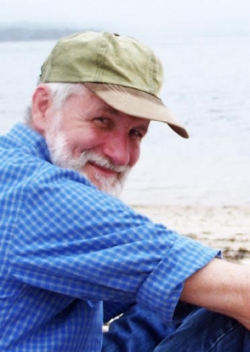David Scott Robson
1949-2021

Scott was born in Halifax and attended school in Amherst, Dartmouth and Bedford. His infancy and early childhood were spent leashed to his twin brother Brock. They did everything together, including resisting co-operation with their brother Peter who was only 23 months older. With three boys under age three, their mother was kept busy.
During university (Dalhousie, Arts and Education) Scott worked summers at the Nova Scotia Museum. One of his first jobs was to restore the Yarmouth to Tusket stagecoach that resided in the museum’s lobby for many decades. He was rightly proud of this job, during which he discovered his calling as a history curator.
After university, Scott taught for a short time in Halifax, followed by a 42-year career at the Nova Scotia Museum, where he served as Curator of History Collections. He had many excellent peers and mentors at the museum, including George MacLaren, Niels Jannasch, Deborah Trask and (posthumously) Harry Piers.
Through most of his career he was responsible for building the provincial artifact collection and for furnishing the Museum's many historic houses as well as his key role in the development of Sherbrooke Village in the 1970s. He carefully researched and answered countless enquiries about old stuff from across the province and country. Later on, he consulted on historical details during the renovation of Government House and Province House.
Scott initiated a number of exhibits and authored or edited a number of books. With Sharon MacDonald, he wrote Old Nova Scotia Quilts / Courtepointes anciennes de la Nouvelle-Écosse (1995), and co-ordinated the exhibit of these quilts across the country for several years. With Shelagh Mackenzie, he wrote An Atlantic Album - Photographs of the Atlantic Provinces, before 1920 (1985) and Halifax Street Names (2002).
Scott retired in 2012, largely in response to what he saw as the Nova Scotia Museum’s neglect of its traditional curatorial mandate in favour of administration for its own sake. His discussion of this trend was widely applauded at a speech he made to the Canadian Museums Association in 2003.
Scott played piano from boyhood until a few weeks before his death. He was always delighted to stumble across obscure sheet music or piano arrangements. As with most everything else in his life, his taste in music was wide-ranging. Although modest about his talent, he played extremely well, though seldom for more than friends and family. However, in 1969, he was convinced to play the organ at King's College Chapel for his older brother's wedding.
Over the years, Scott’s house became a de facto museum, storage facility and exhibition space. First-time visitors quickly gained an appreciation of his many interests, which included origami, hooked mats, Balinese and Venetian culture, 18th and 19th-century paper cutting, local ceramics, pop-up books, stereoscopic slides, wind-surfing and Nova Scotia scenic oil paintings. His friends and family will continue to love and remember Scott for opening their eyes to these and other wonders.
Scott was pre-deceased by his twin brother Brock and by his parents Billee (Sponagle) and Don Robson. He is survived by Bruce Thorne, his partner of 40 years, brother Peter (Barbara) and sister Kim. Also surviving are his niece Kate and nephews Andrew, Oliver, Cameron and Lucas along with several great nieces and nephews.
Scott’s nephew Oliver remembers… The origami, the woven paper stars, the Christmas trees with real candles, the pop-up books, times at Cherry Hill, the house of stairs and all the nooks and crannies. The Japanese maple. Brock fixing the brakes on Scott’s Malibu in Grampa's driveway. The frog on the side of the museum. Life is all about memories.
The family asks that donations in Scott’s memory be made to Doctors Without Borders Canada (www.doctorswithoutborders.ca).




